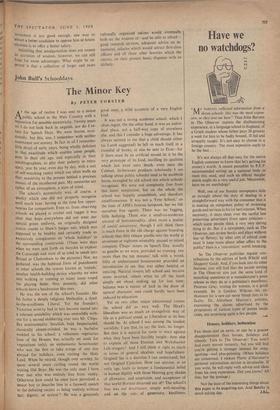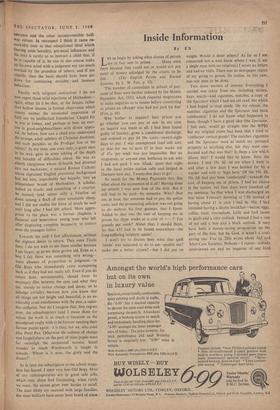John Bull's Schooldays
The Minor Key
By PETER FORSTER AA I the age of twelve I was sent to a minor .1,,public school in the West Country with a reputation for sensible eccentricity. Twenty years on I do not look back in anguish. nor do I re- turn for Speech Days. We were beaten occa- sionally, but this, too, I remember with neither resentment nor ecstasy. In fact in all 1 remember little detail of early years, being wholly deficient In that exactitude which enables some people, even in their old age, and especially in their autobiographies, to plot their puberty in retro- spect, year by year, even day by day, with a sort of self-watching vanity which too often walls up their sensitivity to the present behind a precious mosaic of the recollected past. My memories are rather of an atmosphere. a state of mind.
The school's eccentricity was, of course, a quality which one did not properly recognise until much later, having at the time few oppor- tunities for comparison. Even so, from observing schools we played at cricket and rugger it was Clear that boys everywhere did not wear our special green uniform, an originally designed cotton cousin to Shaw's Jaeger suit, which was supposed to be healthy and certainly made us excessively conspicuous on 'whole holidays' in the surrounding countryside. (These were days when we were sent forth on bicycles to explore the Cotswolds and most of us tried to sneak into Stroud or Cheltenham to the pictures.) Nor, we gathered, was the habitual form of punishment at other schools the system known as 'rounds,' another health-building device whereby we were sent walking or running so many times round the playing fields. Nor, patently, did other schools have a headmaster like ours.
He was the son of the school's founder, like his father a deeply religious Methodist, a dyed- In-the-woolliness Liberal. Yet the founder's Victorian severity had in him become muted into a tolerant amiability which was unworldly with- out for a second slobbering over into Mr. Chips- like sentimentality. Smallish, bald, bespectacled, classically absent-minded, he was a bachelor wedded to his school, a vehement vegetarian (one of the Houses Was actually set aside for vegetarians only), an enthusiastic Scoutmaster who was the first to take troops of any size abroad for holidays, even visiting the Holy Land. When he retired, though over seventy, he spent several years cycling round the world visiting Old Boys. He was the only man I have ever met who was entirely free from vanity. Otherwise how could he once have permitted a senior boy to describe him in a farewell speech to the debating society as being 'entirely without tact, dignity, or system'? He was a genuinely good man. a mild eccentric of a very English kind.
It was not a strong academic school, which I often regret. On the other hand, it was an indivi- dual place, not a half-way copy of anywhere else, and this I consider a huge advantage. It has always seemed to me that a child should either (as Lamb suggested) be left to teach itself in a roomful of books, or else be sent to Eton—for if there must be an artificial mould let it be the very prototype of its kind, instilling its qualities which last even unto death, even unto the Cabinet. In-between products (obviously I am talking about public schools) tend to be snobbish bores, strangled by old school ties which nobody recognises. We were not completely free from this latter temptation, but on the whole the school was happily unsnobbish, and therefore unselfconscious. It was not a 'Free School.' on the lines of APH's famous lampoon, but we felt ourselves free agents. There was no fagging, little bullying. There was a small-to-moderate amount of homosexuality, often more a matter of arnitie amoureuse, though 1 still think there is much force in the old charge against boarding schools that they release youths into the world at seventeen or eighteen miserably unused to mixed company. Chaps' sisters on Speech Day, usually as gauche as we were, provided no training, any more than the ten minutes' talk with a bored, lofty or embarrassed housemaster provided an introduction to sex that was either helpful or enticing. Natural inverts left school and became more inverted, others when let off the leash simply set about making up for lost time; balance was a matter of luck in the draw of natural character, and could hardly have been induced by education.
Yet on two other major educational counts the school did us very well. The Head's liberalism was as much an evangelistic way of life as a political creed, as Liberalism at its best should be. At school I was among the loudest socialists; I am that, to say the least, no longer. But then it is natural for some to react against what they have been forcibly taught--how else to explain all those Etonian and Wykehamist Left-wingers? And I still think it right to teach in terms of general idealism and hopefulness Original Sin is a doctrine I can understand, but not Original Cynicism. How can anyone, at an early age, learn to temper a fundamental belief in human dignity with those blurring grey shades of allowance, and scepticism, and acceptance of that world Horatio dreamed not of? The school's bias was not doctrinaire, simply well-meaning, and on the side of generosity, kindliness, tolerance and the other incontrovertible half- Way virtues. In retrospect 1 think it came re- markably near to that educational ideal which (leaving aside heredity, pre-natal influences and the rest) is surely so to instruct a child that, if he is capable of it, he can in due course make 013 his own mind with a judgment not too much overlaid by the prejudice of others; and if not capable, then the basis should have been put down for continuing sociable and humane behaviour.
Equally with religious instruction. I do not now regret those mild injections of Methodism— again, either let it be thus, or the Jesuits, rather than hollow lessons in formal observance which Convey neither the emotional inspiration of faith nor its intellectual foundation. Chapel for (Is was at lowest, and perhaps at best, an exer- cise in good-neighbourliness with divine appro- val. As before, how can a child ever understand the strange, adult subtlety of Christian doctrines, and such parables as the Prodigal Son or the talents? In my time, one man only, a great man in his way, gave us some inkling of the depth and breadth of difficulties ahead. He was an elderly clergyman whom ill-health had diverted into our backwater, a natural Roman Catholic Whose ingrained English provincial background had led him, improbably but happily, into an independent brand of Methodism. A scholar, indeed an eradit, and something of a courtier, he seemed (and seems still) a Fenelon set down among a flock of most unsuitable sheep, and I did not realise the force of much he said Until long after I had left school. More appro- priate to the place was a former chaplain, a flustered and benevolent young man who left after displaying complete incapacity to control even the youngest forms.
Towards the staff I feel affectionate, without the slightest desire to return. They were Titans then; I do not wish to see them smaller because I am larger, or to see them grown old. Even as a boy I felt there was something very wrong— some absence of proportion in judgment—in Old Boys who immediately came scampering back as if they had not really left. Even if you do return later, sentimentality should form its necessary film between the eyes and what they see; merely to notice change and decay, or to adjudge triviality because now you know that all things are not bright and beautiful, is an in- tolerably cruel interference with the past, a value- less catharsis. Nor do I imagine that, first regrets over, the schoolmasters (and I mean those for whom the work is as much a vocation as the priesthood) really wish to be forever meeting their former pupils again : it is they, not we, who must Play Peter Pan. Otherwise the sadness of change and forgetfulness on the part of most pupils must far outweigh the occasional success. Small wonder so much Wordsworth is taught in schools. 'Where is it now, the glory and the dream?'
So in time my subscription to the school maga- zine has lapsed. I meet very few Old Boys. Most of my contemporaries are in good safe jobs, which they alone find fascinating; when rarely we meet, the names grow ever harder to recall. The least likely are married with large families; the most brilliant have never been heard of since.



































 Previous page
Previous page